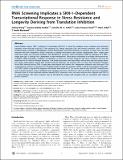| dc.contributor.author | Wang, Jinling | |
| dc.contributor.author | Robida-Stubbs, Stacey | |
| dc.contributor.author | Tullet, Jennifer M. A. | |
| dc.contributor.author | Rual, Jean-Francois | |
| dc.contributor.author | Vidal, Marc | |
| dc.contributor.author | Blackwell, Thomas Keith | |
| dc.date.accessioned | 2013-01-17T21:07:42Z | |
| dc.date.issued | 2010 | |
| dc.identifier.citation | Wang, Jinling, Stacey Robida-Stubbs, Jennifer M.A. Tullet, Jean-François Rual, Marc Vidal, T. Keith Blackwell. (2010) RNAi screening implicates a SKN-1–dependent transcriptional response in stress resistance and longevity deriving from translation inhibition. PLoS Genetics 6(8): e1001048. | en_US |
| dc.identifier.issn | 1553-7390 | en_US |
| dc.identifier.uri | http://nrs.harvard.edu/urn-3:HUL.InstRepos:10196730 | |
| dc.description.abstract | Caenorhabditis elegans SKN-1 (ortholog of mammalian Nrf1/2/3) is critical for oxidative stress resistance and promotes longevity under reduced insulin/IGF-1–like signaling (IIS), dietary restriction (DR), and normal conditions. SKN-1 inducibly activates genes involved in detoxification, protein homeostasis, and other functions in response to stress. Here we used genome-scale RNA interference (RNAi) screening to identify mechanisms that prevent inappropriate SKN-1 target gene expression under non-stressed conditions. We identified 41 genes for which knockdown leads to activation of a SKN-1 target gene (gcs-1) through skn-1-dependent or other mechanisms. These genes correspond to multiple cellular processes, including mRNA translation. Inhibition of translation is known to increase longevity and stress resistance and may be important for DR–induced lifespan extension. One model postulates that these effects derive from reduced energy needs, but various observations suggest that specific longevity pathways are involved. Here we show that translation initiation factor RNAi robustly induces SKN-1 target gene transcription and confers skn-1-dependent oxidative stress resistance. The accompanying increases in longevity are mediated largely through the activities of SKN-1 and the transcription factor DAF-16 (FOXO), which is required for longevity that derives from reduced IIS. Our results indicate that the SKN-1 detoxification gene network monitors various metabolic and regulatory processes. Interference with one of these processes, translation initiation, leads to a transcriptional response whereby SKN-1 promotes stress resistance and functions together with DAF-16 to extend lifespan. This stress response may be beneficial for coping with situations that are associated with reduced protein synthesis. | en_US |
| dc.language.iso | en_US | en_US |
| dc.publisher | Public Library of Science | en_US |
| dc.relation.isversionof | doi://10.1371/journal.pgen.1001048 | en_US |
| dc.relation.hasversion | http://www.ncbi.nlm.nih.gov/pmc/articles/PMC2916858/pdf/ | en_US |
| dash.license | LAA | |
| dc.subject | molecular biology | en_US |
| dc.subject | transcriptional regulation | en_US |
| dc.subject | transcription initiation and activation | en_US |
| dc.subject | post-translational regulation of gene expression | en_US |
| dc.subject | genetics and genomics | en_US |
| dc.subject | gene function | en_US |
| dc.subject | gene expression | en_US |
| dc.subject | developmental biology | en_US |
| dc.subject | aging | en_US |
| dc.subject | cell biology | en_US |
| dc.subject | gene expression | en_US |
| dc.subject | cellular death | en_US |
| dc.subject | stress responses | en_US |
| dc.title | RNAi Screening Implicates a SKN-1–Dependent Transcriptional Response in Stress Resistance and Longevity Deriving from Translation Inhibition | en_US |
| dc.type | Journal Article | en_US |
| dc.description.version | Version of Record | en_US |
| dc.relation.journal | PLoS Genetics | en_US |
| dash.depositing.author | Vidal, Marc | |
| dc.date.available | 2013-01-17T21:07:42Z | |
| dash.affiliation.other | HMS^Anaesthesia-Massachusetts General Hospital | en_US |
| dash.affiliation.other | HMS^Cell Biology | en_US |
| dash.affiliation.other | HMS^Genetics | en_US |
| dash.affiliation.other | HMS^Pathology | en_US |
| dc.identifier.doi | 10.1371/journal.pgen.1001048 | * |
| dash.contributor.affiliated | Blackwell, Thomas | |
| dash.contributor.affiliated | Rual, Jean-Francois | |
| dash.contributor.affiliated | Vidal, Marc | |


